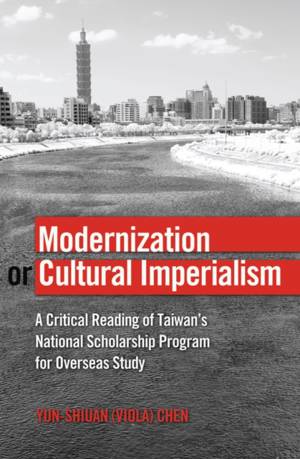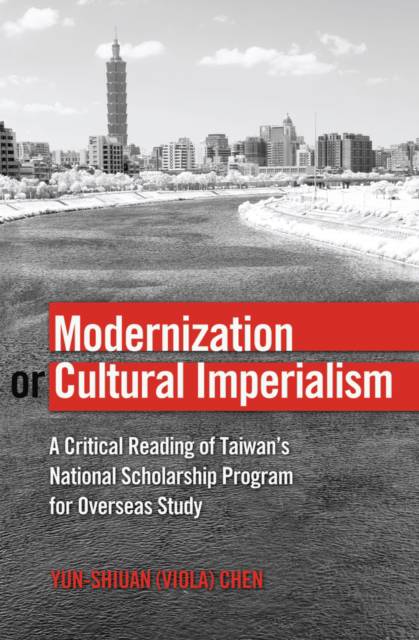
- Afhalen na 1 uur in een winkel met voorraad
- Gratis thuislevering in België vanaf € 30
- Ruim aanbod met 7 miljoen producten
- Afhalen na 1 uur in een winkel met voorraad
- Gratis thuislevering in België vanaf € 30
- Ruim aanbod met 7 miljoen producten
Zoeken
Modernization or Cultural Imperialism
A Critical Reading of Taiwan's National Scholarship Program for Overseas Study
Chen
€ 82,95
+ 165 punten
Uitvoering
Omschrijving
This book focuses on the development of Taiwan's long-standing National Scholarship Program for Overseas Study between 1955 and 2000. The National Scholarship Program can be seen as Taiwan's governmental pursuit of strategic modernization for national and social development. Strategic modernization does not necessarily imply a linear, progressive, and technological modernity; but should be viewed as an adjustable, flexible, and sustainable effort that transforms and assists a nation, like Taiwan, to adapt itself within its constrained and changing post-colonial condition. This view of strategic modernization is based upon an interrogation of the discourses surrounding the scholarship program, using post-colonial theories as a referential framework. The research includes an ethnographic analysis of discourse, investigating the program from two perspectives: the researcher's critical discourse analysis of historical texts, and the narratives provided by program stakeholders. The juxtaposition of these two discursive perspectives not only reveals different facets of the program, but more importantly, tracks the dynamic and constantly unfolding interwoven complex of political, economic and cultural threads that have rarely been considered together.
Specificaties
Betrokkenen
- Auteur(s):
- Uitgeverij:
Inhoud
- Aantal bladzijden:
- 198
- Taal:
- Engels
- Reeks:
- Reeksnummer:
- nr. 24
Eigenschappen
- Productcode (EAN):
- 9781433120282
- Verschijningsdatum:
- 21/03/2013
- Uitvoering:
- Paperback
- Formaat:
- Trade paperback (VS)
- Afmetingen:
- 148 mm x 224 mm
- Gewicht:
- 362 g

Alleen bij Standaard Boekhandel
+ 165 punten op je klantenkaart van Standaard Boekhandel
Beoordelingen
We publiceren alleen reviews die voldoen aan de voorwaarden voor reviews. Bekijk onze voorwaarden voor reviews.











